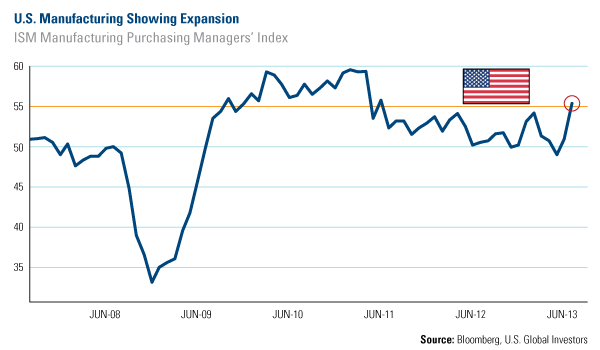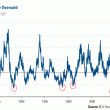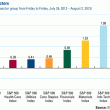The Economy and Bond Market Radar (August 5, 2013)
Treasury yields moved higher this week as global economic data was showing signs of improvement. The monthly purchasing managers indices are released on the first day of the month and are widely followed as an indication of an economy’s direction. The chart below shows this strong improvement in the U.S. PMI but we were not alone as China, Brazil and several countries in Europe positively surprised. This index is often used as a leading indicator as these data points bode well for an improving global economy. Other key data points announced this week included second quarter GDP, which was underwhelming, and employment data, which more or less maintained the status quo. The Fed met and released a statement which acknowledged the modest economic growth and did not hint at tapering its QE program.
Strengths
- U.S. ISM data was strong as July experienced the biggest single monthly point gain since 1996. The underlying employment component was also strong, which potentially bodes well for manufacturing hiring.
- Economic sentiment in the eurozone hit the highest level in more than a year and adds fuel to the fire that the economic malaise in Europe may finally be coming to an end.
- The Fed backtracked some this week with a rather dovish statement, potentially indicating no change in monetary policy in September.
Weaknesses
- Consumer confidence fell in July but does remain in a modest multi-year uptrend.
- Mortgage applications fell 3.7 percent last week and are at the lowest levels in more than two years. The spike in yields and mortgage rates in recent months has significantly dampened the enthusiasm for continued housing recovery.
- Nonfarm payrolls grew 162,000 in July, modestly below estimates and not enough to establish confidence that the economy can move forward without continued monetary stimulus.
Opportunity
- Despite recent conflicting commentary, the Fed continues to remain committed to an accommodative policy.
- Key global central bankers are still in easing mode such as the European Central Bank, Bank of England and the Bank of Japan.
- The recent sell off in bonds is likely an opportunity as higher yields will act as a brake on the economy and potentially become self fulfilling, thus postponing Fed tapering.
Threat
- Inflation in some corners of the globe is getting the attention of policy makers and may be an early indicator for the rest of the world.
- Trade and/or currency wars cannot be ruled out which may cause unintended consequences and volatility in the financial markets.
- The recent bond market sell off may be a “shot across the bow” as the markets reassess the changing macro dynamics.














